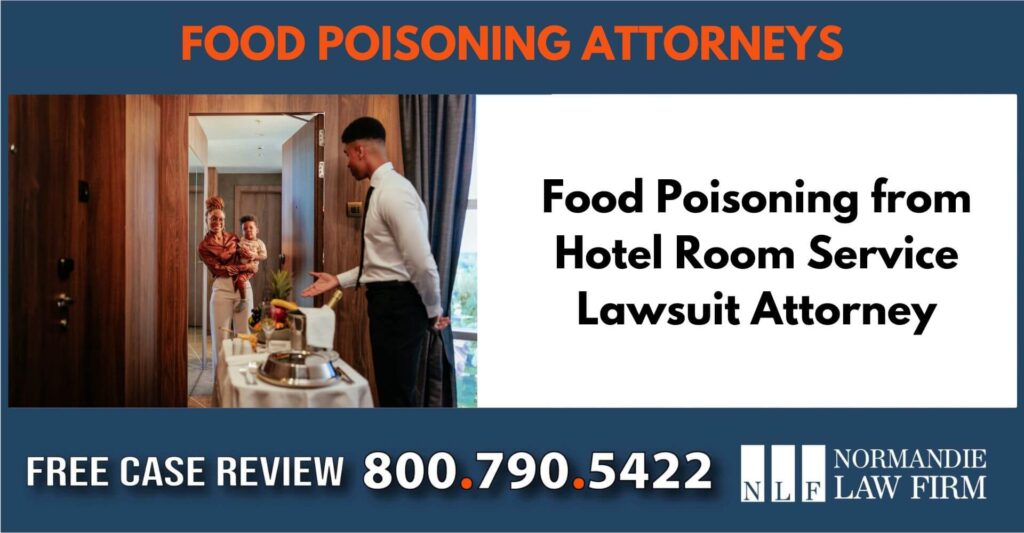Room service is a hotel amenity that allows you to order food that’s cooked on site and brought up to your room. Though it’s nice to go out for a meal, there are certainly occasions where having food delivered right to your door is the most comfortable option. Plus, the meal is cooked at the hotel, so you generally receive it faster than if you ordered from an off-site restaurant.
When you order food from room service at a hotel, you expect that the kitchen facilities are clean and sanitary. Workers should also follow industry standards on how to handle food safely, so that people don’t get sick from eating contaminated food. Unfortunately, there is a lot of neglect are willful disregard of safety standards in hotel kitchens. Or, there may be a lack of proper cleaning and maintenance, which can also contribute to food borne illnesses at a hotel.
If you or your loved one had food poisoning due to negligence by hotel staff, you may have grounds to sue the hotel for monetary compensation. For more information on your rights and legal options, talk to a hotel room service food poisoning lawsuit attorney.

Our Recent Verdicts and Settlements
$2.5 Million
$599,000
$1.5 Million
$600,000
$525,000
$1.2 Million
What are the Causes of Food Poisoning?
There are many ways that hotels and restaurants can fail in their duty of care to the public. This includes not taking reasonable care to prevent incidents of food poisoning, whether you order room service or dine at a hotel restaurant. Below are some of the ways that food can be tainted and end up causing pain and suffering to hotel guests:
- Not cleaning / washing the food thoroughly
- Failing to wash hands prior to handling food or after handling certain ingredients, like raw chicken
- Undercooking meat, i.e., checking that the internal temperature is at a safe level
- Not letting foods cool down to room temperature before storage in the refrigerator or freezer
- Presence of pests like mice and cockroaches due to unsanitary conditions
Safe food preparation and handling practices are established by the U.S. Food and Drug Administration, so there is no excuse for a hotel to be negligent in these areas. When there is a failure to comply with these guidelines, hotels and other businesses may be sued by those who are injured or killed by food poisoning.
Examples of Foodborne Illnesses
Though this is not a comprehensive list, it gives you an idea of the illnesses that can be caused when people are careless in the way they harvest, process, cook, and preserve different types of food. Common foodborne illnesses in the U.S. include:
- Salmonella –there are over 2,000 variations of salmonella, a bacterium found in animal products like meat, eggs, and dairy. Thousands of people in the U.S. die every year from the effects of salmonella.
- Botulism – caused by a bacterium known as Clostridium botulinum, the illness is often traced to bacterial growth in canned goods, especially vegetables and meat. To avoid getting sick from botulism, make sure to throw away expired or bulging canned goods.
- E. coli – typically found in undercooked meat, E. coli causes severe diarrhea in those who ingest the bacterium through contaminated food. The bacterial is usually passed through germs on people’s hands, which is why frequent handwashing is essential for those working in hotel kitchens.
- Listeriosis – this is a particularly dangerous illness, as it can be transmitted from the mother to the unborn child. Most cases of listeriosis are due to the growth of listeria when food is stored in refrigerators that are not cold enough (below 40 degrees F).
- Shigellosis – this is an infection that’s spread through bacteria (shigella) on people’s hands. Around 25,000 case of the illness are reported ever year, though the actual number of victims is probably much higher.
- Hepatitis A – a strain of hepatitis that can cause liver damage and fatality. The disease can be spread from one person to another through food or water.
Food Poisoning has Devastating Consequences
In the U.S., approximately 5,000 people die on an annual basis due to a foodborne illness. Food poisoning deaths were much more common in past generations, but the rate of fatality decreased as people became more educated on food safety and signs that food has gone bad. The problem is, we can only control our own actions, so there’s always a risk of contaminated food exposure when we order food that’s cooked by someone else. That’s why cases of food poisoning are so common, even at upscale hotels and resorts.
To give you a sense of how bad the problem is, the Center for Disease Control and Prevention estimates that around 76 million people are exposed to some type of foodborne illness every year. Even more alarming, an estimated 300,000 people are hospitalized with serious cases of botulism, Listeriosis, and other illnesses caused by tainted food.
If you suffered food poisoning at a hotel, make sure to report the business to the city health department. Then, contact our law firm and speak with a lawyer experienced in hotel room service food poisoning lawsuits.
Signs and Symptoms of Food Poisoning
Because there are numerous illnesses that are associated with contaminate food, many symptoms can indicate that you may have a case of food poisoning. Some of these symptoms appear within minutes of consuming the food, while others can take weeks before they appear. With that in mind, here are the signs that indicate you may have food poisoning:
- Upset stomach, particularly sharp, painful sensations in the stomach
- Headaches
- Vomiting
- Diarrhea
- Fever
- Fatigue
If you are having these symptoms, don’t hesitate to seek medical attention. Thankfully, most people are able to recover without long-term health issues. However, a serious case of food poisoning may be life-threatening, especially if you have health conditions like cancer and diabetes.
Statute of Limitations to Sue for Hotel Room Service Food Poisoning
The laws in California allow injury victims 2 years to file a claim for monetary damages, meaning you have 24 months from the date of injury to sue the hotel. There is another deadline that has to do with wrongful death lawsuits, meaning that the spouse or family member of someone that died from food poisoning has filed a civil claim. In this instance, the deadline to seek wrongful death benefits is 2 years from the date of death.
Make sure to contact our office, where a food poisoning lawsuit lawyer can guide you through the claims process. It’s essential to initiate a claim as soon as possible, as you will lose the right to compensation if you are past the statute of limitations for a personal injury or negligent death lawsuit.
No Upfront Cost to Hire a Food Poisoning Attorney
Here at Normandie Law Firm, we believe that victims of negligence and misconduct should not be responsible for the cost of legal fees. This should be covered by the party that failed in their duty of care, which is why we have a Zero Fee Guarantee policy. That means you pay us nothing for the cost of legal services, which we only receive as a part of your settlement award. If we don’t win your case, you owe us $0, even if we take your case to trial.
Please reach out to us 24 hours a day, 7 days a week, and talk to a lawyer who can sue for a case of food poisoning by hotel room service.
Other Pages on Our Website Related to This Topic













